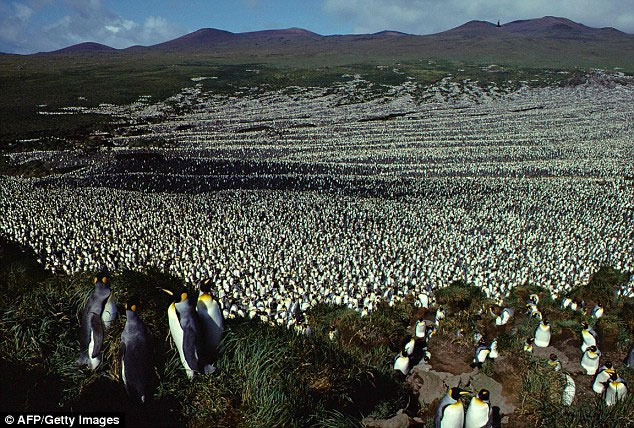The world's largest penguin kingdom collapsed mysteriously
From a kingdom of 2 million "people", the number of penguins on Île aux Cochons island mysteriously decreased with the number reaching 88% in more than 30 years.
Near the South Pole of the Earth is an island in the Indian Ocean, with the French name Île aux Cochons .
It is really a giant kingdom for penguins. It is also not wrong to call Île aux Cochons a kingdom, because the penguin species living there are king penguin (king penguin) .

Penguin Kingdom on Île aux Cochons island.
However, this giant kingdom has been collapsing with a tremendous scale. In 1980, there were about 2 million penguins living here, including more than 500,000 pairs of breeding age birds.
Today, the number is only 60,000 pairs. A reduction is so great that science still does not understand why.
To get these indicators, experts from Chizé Biological Research Center (CNRS - France) used satellite data since 2005, combining with some photos taken in the period 1982 - 1988. Conclusion As a result, the number of penguins here is reduced by 88% - a loss corresponding to one-third of the total number of king penguins worldwide.
More specifically, the team calculated the contours of the current island, and calculated how many areas are covered by plants. The reason is that king penguins live only in flat, slightly sloping areas, and without trees. Rather, where they occupy, plants are less likely to grow.
But since 1980, vegetation began to gradually cover the penguin breeding area. This is a sign of the collapse of an entire kingdom.

Vegetation cover gradually eroded since 1982.
The problem is why?
It is really an easy question to answer, because other penguin populations nearby are not reduced. Like the Île de la Possession island, penguins here are almost the same since 1960. There are even increases in the number of Marion and Kerguelen islands.
This led experts to believe that the reason is entirely in Île aux Cochons, not a global phenomenon, and does not seem to be related to climate change. The problem is that no one has found the reason yet.

The first hypothesis was that the polarization event in the Indian Ocean in 1997 affected king penguins on the island of de la Possession.
Currently, the expert group has made several assumptions. The first was the polarization event in the Indian Ocean in 1997. This event heated the ocean surface in the Île de la Possession area, making it difficult for penguins to find food and suffer from pepper. extreme to the reproductive process.
The de de la Possession has since been restored, but the hypothesis is that the event also affected the kingdom of Île aux Cochons, and where it takes more time to recover.
Another theory is the migration process . Basically, king penguins are very attached to their homeland. They will always stay where they are born and paired. However, 2005 images show that there is another population moving closer to the coast - an area they have never been there. However, this population is too small to explain the disappearance of a large number of penguins.

King penguins are very attached to their homeland.
Foreign animals - like wild cats, rats . are also thought to influence. In particular, fleas on mice can cause widespread disease. However, such an epidemic occurred on Marion Island in 1990, but it did not cause too much influence.
What about natural disasters? It is also very unlikely, because there is no evidence that tsunamis or volcanoes are active.
One of the reasons for finding such a difficult cause is because it has been so long since science has approached this island. The last time the scientific community landed on the island was in 1982. So to clarify the cause, it might be more reasonable to take a field trip.
"The whole kingdom collapsed, and the reason is still mysterious. We need to solve it" - quoted in the study's report.
"The collapse process has been going on for at least 20 years, and it is still going on."
The study is published in the journal Antarctic Science.
- Ruins of the mysterious kingdom of Guge in Tibet
- 'Breaking in' emperor penguin territory
- Approaching a population of 9,000 emperor penguins
- Found an ancient penguin as large as a human
- Why don't penguin's feet get cold?
- Explore the mysterious cave kingdom in the Himalayas
- Excavating the forgotten kingdom in Scotland
- Surprise with gay couple penguins ... incubating
- The dark hidden corner has been hidden for hundreds of years of the cutest animal on the planet
- Penguins swim 8,000km to visit life-saving benefactors
- How to survive when stuck in a collapsed cellar?
- HMS Artful - World's largest nuclear submarine
 Animal 'suffering' after hibernation
Animal 'suffering' after hibernation Why do goats climb well?
Why do goats climb well? Scientists were surprised to see chimpanzees eating turtles
Scientists were surprised to see chimpanzees eating turtles Giant catfish died deadly due to drought in Thailand
Giant catfish died deadly due to drought in Thailand